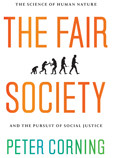
The Fair Society: The Science of Human Nature and the Pursuit of Social Justice
Peter Corning
256 pages, University of Chicago Press, 2011
In the aftermath of a financial crisis in which 34 million people lost their jobs and 60 million have been pushed into severe poverty, Peter Corning’s The Fair Society could not be more timely. In a poignant and well-articulated book, Corning tackles some of the fundamental contradictions plaguing the United States and other social systems: Is it just that none of the architects of the biggest robbery in world history went to jail? Is it fair to ask the victims affected by the fraud to pay for the budget deficits caused by the financial plunderers? How long will “we, the robbed people” continue to tolerate such injustices?
Corning is adamant that the unfair distribution of power and wealth among and within societies is at the basis of existing and impending crises: climate change, nuclear proliferation, peak oil, water and food shortages, financial meltdown, social unrest. But Corning’s book is not a treatise on the global crises resulting from turbo-capitalism. The Fair Society, instead, is a rigorous attempt to reconcile the science of human nature with the pursuit of a fair socioeconomic system. The questions raised in his book—Is justice a social obligation or the interest of the stronger? Are we inherently just or selfish? Are capitalism and socialism fair? What are the central features of a Fair Society?—have been the central preoccupations of philosophers such as Plato, Rousseau, Hobbes, Hume, Locke, Kant, and Marx.
The importance of these questions cannot be overstated. For the last 30 years, socioeconomic policies at the national and global level have been dominated by free market fundamentalism, an ideology based on the assumption that people’s primary motivation is the pursuit of profit. In most established democracies, this doctrine has guided the macroeconomic agenda of both conservative and liberal administrations, or what Gore Vidal called “the two right wings” of the “Property Party.” It also has directed the global economic policies of international financial institutions, such as the International Monetary Fund, the World Bank, and the World Trade Organization, with disastrous social and economic effects for the developing world.
Working from the presumption that all people are inherently selfish, the proponents of free market fundamentalism have argued that their doctrine is the only public philosophy that works. It is a pity that countless studies, some of them quoted in Corning’s book, show exactly the opposite. To be sure, the science of human nature is far from conclusive. Existing evidence largely indicates that people are at times selfish, competitive, and unjust and at other times altruistic, cooperative, and fair. More important, cross-cultural research shows that our sense of fairness and unfairness is largely shaped by the social and environmental circumstances in which we live.
In the last chapters of the book, Corning proposed a “biosocial contract” to develop a fair society in the United States and around the world, which he describes as a “collective survival enterprise” able to satisfy the “primary needs”: thermoregulation, waste elimination, nutrition, water, mobility, sleep, respiration, physical safety, physical health, mental health, communications, social relationships, reproduction, and nurturance of off spring. A fair society, the author argues, can be created through policies aimed at promoting full employment, ensuring a living wage, strengthening welfare services, reforming the private sector, and developing a more equitable tax system. Corning argues that this biosocial contract can overcome the limitations and unfair qualities of both capitalism and socialism. Capitalism, he believes, is too unequal to allow poor people to meet their basic biological necessities, and socialism is too indifferent to meritocracy and innovation.
Corning’s proposal, I am afraid, is likely to be dismissed by both free market evangelists and the so-called moderate liberals. The former will judge it as an attack on their narrow conception of freedom; the latter will disregard it as a pie-in-the-sky idea. Corning’s proposal is necessary and on target, but at least two observations can be made. First, it is too reductionist to depict most human actions as motivated by what Corning calls the “underlying survival challenge.” There is more to life than satisfying our primary needs. Our existence has some deeper, more creative meaning than mere survival and reproduction.
Second, although Corning’s idea for a fair society is depicted as something new, the author admits that it is largely based on “a society that more closely resembles what already exists in countries like Denmark, the Netherlands, and Sweden.” Although northern European countries can be considered models of social capitalism, they are far more social than capitalist. It is curious that Corning does not address this fact. Is it too controversial to be acknowledged?
Still, it is refreshing to hear a public intellectual like Corning call for the pursuit of a fair society. Many will surely be skeptical about this proposal, or simply view it as sheer utopia. But the real utopia is the belief that the current social system can proceed unchanged.
Roberto De Vogli is an associate professor at the University of Michigan School of Public Health. His research focuses on how globalization, economic inequalities, and psychosocial factors affect health and health inequalities in developed and developing countries.

